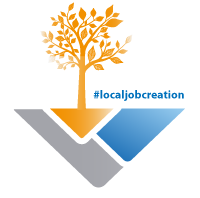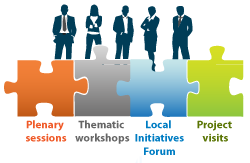Développement économique et création locale d’emplois (LEED)
10th Annual Meeting of the OECD LEED Forum on Partnerships and Local Development (Stockholm, Sweden)
| WHAT | HOW | WHO | MATERIAL | WHERE | CONTACT |
 JOB CREATION JUST AHEAD: BUILDING ADAPTABLE LOCAL LABOUR MARKETS
JOB CREATION JUST AHEAD: BUILDING ADAPTABLE LOCAL LABOUR MARKETS
In co-operation with the Swedish Public Employment Service, the Swedish Ministry of Employment, SALAR- Swedish Association of Local Authorities and Regions and WAPES - World Association of Public Employment Services
23rd - 25th April 2014, Stockholm, Sweden
What
14 interactive workshops reviewed experiences in the local implementation of the youth guarantee, measuring social impact; evidence based policies for tackling disadvantage, entrepreneurial education and youth entrepreneurship.
Special focus: a series of pre and post-events reviewed the latest development in understanding:
- Ways to reduce school dropout rates
- Links between skills, economic diversity and local development
- New approaches to area-based partnerships and local governance
- Ecosystems for social innovation
- Brokerage as the key to unlocking the new economy
How
 Plenary sessions, interactive workshops and the Local Initiatives Forum provided opportunities to learn from international experience, present projects and network with peers from other counties.
Plenary sessions, interactive workshops and the Local Initiatives Forum provided opportunities to learn from international experience, present projects and network with peers from other counties.
Project visits
Participants had the opportunity to learn directly from a range of projects based in Stockholm and discussed their work with staff and service users.
Working language: English.
Who
The 10th Annual Meeting of the OECD LEED Forum on Partnerships and Local Development brought together some 250 representatives from local partnerships, government officials, public employment services, local leaders, youth organisations, social entrepreneurs, business representatives, and academics.
There was no participation fee. Participants were expected to cover their own travel and accommodation expenses.
Material
 Networking session: projects presented
Networking session: projects presented
 Presentations
Presentations
Wednesday 23rd April 2014 | Pre-event workshop
Chair: Emily Svärd, Youth Strategy Expert, Swedish Public Employment Service
- Addressing dropout prevention: What do we know about effective interventions? Anna Liljeström, Ph.D., The Gothenburg Region Association of Local Authorities, Sweden
- Working with parents to prevent early school leaving, Ulf Hägglund, URBACTand Jean Jacques Derrien, City of Nantes, PREVENT – parents and early school leaving, France
- Lessons from Pathways to Education Canada: A community-based approach to improving education, employment outcomes & community resilience, Stacey J Young, Research Director, Ontario Council on Articulation and Transfer, Canada
- How to bring those who dropped out back into education, Thomas Townsend, University of Ottawa, Canada
Thursday 24th April 2014
PLENARY 1: JOB CREATION JUST AHEAD
Chair: Sylvain Giguère, Head of the LEED Division, OECD
- Building quality jobs at the local level - Key findings from a comparative OECD Review, Jonathan Barr, Policy Analyst, OECD LEED
- Local job creation policies in Canada, Thomas Townsend, National expert for OECD Local Job Creation project, University of Ottawa, Canada
- Sweden: Highlights from an OECD Review, Lars Niklasson, National expert for OECD Local Job Creation project, Linköping University, Sweden
- Best practices from the Czech Republic, Martin Bakule, National expert for OECD Local Job Creation project, National Training Fund, Czech Republic
- Michel Angers, Mayor of Shawinigan, Quebec, Canada
- Main opportunities and challenges for Public Employment Services, Annie Gauvin, Director for Research, Evaluation and International Affairs, Pôle Emploi - Public Employment Service, France, Vice-President, WAPES Europe
PLENARY SESSION 2: PARTNERSHIPS TO SUPPORT SCHOOL TO WORK TRANSITIONS
Chair: Clas Olsson, Deputy Director General, Swedish Public Employment Service
- Kathrin Höckel, Skills Strategy, Directorate for Education and Skills, OECD
- Supporting successful transition from school in Glasgow, Martin Collins, Glasgow City Education Department, United Kingdom
CONCURRENT WORKSHOPS
- Workshop A - The local implementation of the youth guarantee, Corinne Nativel, expert for OECD LEED Local Implementation of the Youth Guarantee project
- Workshop D - Impact evaluation by social enterprises: Measuring the un-measurable, Jim Clifford, OBE, Baker Tilly Head of Not-for-Profit Advisory, Public Sector and Social Impact Services; Chair of the European Commission’s GECES subgroup on Social Impact Measurement, United Kingdom
- Workshop D - Social impact measurement: why and for whom? Ariane Rodert, European Economic and Social Committee, Vice President EESC Group III, Rapporteur of the EESC opinion on social impact measurement, Belgium
- Workshop D - Social impact as a driver or as a base for payment? Nicole Alix, Mont Blanc meetings, International Forum of Social and Solidarity Entrepreneurs, Secretary of the Board
- Workshop D - Third Sector Impact (TSI), Bernard Enjolras, Research Director at the Institute for Social Research (Oslo) and Coordinator EU-FP7 Third Sector Impact (TSI) project, Norway
- Workshop D - Social impact measurement, an opportunity for social enterprises? Denis Stokkink, Director, Pour la Solidarité, Belgium
- Workshop G - Youth entrepreneurship, Robert Arnkil, Lead Expert of URBACT My Generation at Work project
- Workshop G - Youth entrepreneurship context and the vision of Public Employment Service, Yasemin Özüm Bozkurt, Employment Expert, Turkey
- Workshop H - Local and regional partnerships, Jon Strath, Policy Analyst (SNE) PARES (Partnership between Employment Services), DG Employment, Social Affairs and Inclusion, European Commission
- Workshop H - JobTown, Ian Goldring, Lead Expert, URBACT JobTown project
Friday 25th April 2014
PLENARY SESSION 3: EMPLOYMENT AND INCLUSION PROJECTS IN STOCKHOLM - INTRODUCTION
Introduction on the Swedish and Stockholm labour market policy contexts, Mats Wadman, Director, Head of Department of Analysis, Swedish Public Employment Service
CONCURRENT WORKSHOPS
- Workshop 1 - Arbetsförmedlingen Stockholm City, Eeva Vestlund, Manager, Arbetsförmedlingen Stockholm City, Sweden
- Workshop 2 - Reducing school dropout rates, Anna Liljeström and Lisa Sipari, PlugInnovation/The Gothenburg Region Association of Local Authorities, Sweden
- Workshop 3 - Cooperation between the authorities of the Employment Service and the Prison and Probation Service in Sweden, Christina Rosengren Gustavsson, Arbetsförmedlingen (PES), Sweden
- Workshop 4 - Swedbank, Tord Topsholm and Patricia Kempff, Swedbank, Sweden
- Workshop 4 - Unga Jobb, Swedish PES, David Finch, Senior Administrative Officer and Regional Business sector specialist, Arbetsförmedlingen (PES), Sweden
- Workshop 4 - Building bridges, Lucienne De Clercq, Employment Coordinator, VDAB, Flanders, Belgium
- Workshop 4 - Anna Ternberg, Director of Studies, Nackademin Yrkeshögskola (Higher vocational education), Sweden
- Workshop 6 - Jesper Ackinger, Stockholm Business Region Development, Sweden
PLENARY SESSIONS 4: MANAGING TRANSITIONS DURING THE LIFE-CYCLE
Chair: Robert Strauss, Head of Unit, Employment Analysis, DG Employment, Social Affairs & Inclusion, European Commission, Chair, OECD LEED Forum on Partnerships and Local Development
Transitions: they are here to stay, Guillermo Montt, Adult Competencies Assessment (PIAAC), OECD
POST-EVENT WORKSHOPS
- Workshop a - 'New regionalism’ as the new local development paradigm? David J.A. Douglas, Rural Planning and Development, University of Guelph, Canada
- Workshop b - Social innovation for social cohesion. Challenges for mindsets and institutional architectures, Adalbert Evers, Emeritus Professor, Doctor, Justus Liebig University, Germany
- Workshop b - A social innovation ecosystem in the Languedoc-Roussillon region, Aurelie Mexandeau, Networks and Communication officer, Regional Union of Cooperation and Participation Cooperatives, France
- Workshop c - The rise of brokerage in the hybrid labour market, Eddy Adams, URBACT Thematic Pole Manager for Social Innovation and Human Capital and Robert Arnkil, Lead Expert of the My Generation at Work project.
Where
|
The meeting was held in Stockholm, the capital of Sweden. Stockholm, one of the most beautiful capitals in the world, is built on 14 islands connected by 57 bridges. The historical buildings, greenery, fresh air and the proximity to the water are distinctive traits of this city.  Logistical information (transportation, meeting venues, hotels, useful information etc.) Logistical information (transportation, meeting venues, hotels, useful information etc.) |
Contacts
For further information about the event, please contact Anna Rubin and Elisa Campestrin at the OECD Secretariat.
In 2013, to reflect its growing relevance as a worldwide network of local development practitioners, the Forum was renamed the OECD LEED Forum on Partnerships and Local Development
.
Documents connexes
- Local Employment and Economic Development (LEED Programme)
- 9th Annual Meeting of the OECD LEED Forum on Partnerships and Local Governance (Dublin-Kilkenny, Ireland)
- PRESS RELEASE: Employment issues will top agenda during OECD LEED Forum on Partnerships and Local Development - 24-25 April in Stockholm, Sweden
